mines
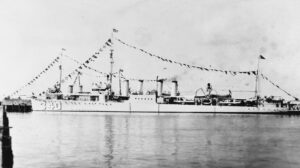
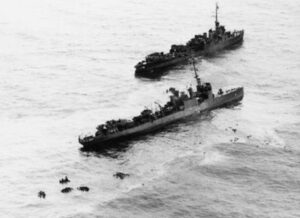 Quite likely one of the most brutal kinds of bombs was the mine. These mostly submerged orbs could take out an unsuspecting ship the minute it made contact with it, usually with no warning at all. So great was the danger to ships in the area, that the nations started building ships for the express purpose of seeking out these mines and destroying them before they were able to destroy a ship in the area. One such ship, the USS Perry was built by Mare Island Naval Shipyard at Mare Island. It was laid down September 15, 1920 and launched October 29, 1921. Named in honor of Oliver Hazard Perry and sponsored by Miss Anne R Scudder, it was commissioned August 7, 1922, with Lieutenant Richard H Booth in command, but it wasn’t initially designed to be a minesweeper.
Quite likely one of the most brutal kinds of bombs was the mine. These mostly submerged orbs could take out an unsuspecting ship the minute it made contact with it, usually with no warning at all. So great was the danger to ships in the area, that the nations started building ships for the express purpose of seeking out these mines and destroying them before they were able to destroy a ship in the area. One such ship, the USS Perry was built by Mare Island Naval Shipyard at Mare Island. It was laid down September 15, 1920 and launched October 29, 1921. Named in honor of Oliver Hazard Perry and sponsored by Miss Anne R Scudder, it was commissioned August 7, 1922, with Lieutenant Richard H Booth in command, but it wasn’t initially designed to be a minesweeper.
Nearly 20 years after the ship was commissioned, the ship was converted to a minesweeper and redesignated DMS-17 on November 19, 1940. This particular ship was the third of eight ships that would be named after Oliver Hazard Perry, which seems to me, rather unheard of, but maybe not. After becoming a minesweeper, the USS Perry (DMS-17) had an illustrious career for almost four years. Veteran Lieutenant JG Charles L Ennis told of his time on the ship, saying, “My battle station was on the Flying Bridge and I saw mines. The proximity of these deadly orbs certainly prevented any rescue ship from effective aid particularly since many of the crew were in the water and would been killed had another mine been exploded.” It was his job to see the danger before it could take down the ship. Of course, they captain knew that it was just as likely that the ship would find the mine when it hit the mine as it was to see it beforehand.
That was exactly the case, when on September 14, 1944 (one day short of the 24th anniversary of the ship being laid down on September 15, 1920), the USS Perry hit a mine at 2:07pm, and sank to the bottom roughly 700 yards south of Angaur Island in less than two hours. Larry Tunks was firing anti-aircraft guns aboard the 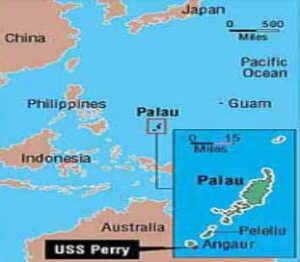
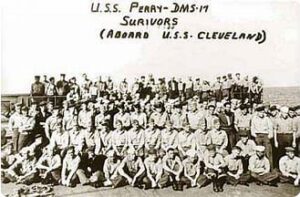 USS Perry when it scraped a mine off Angaur Island, exploding a boiler and killing eight crewmen. One of those killed was his closest ship buddy, a fellow Nebraskan. Another 146 men were plucked from the ocean by US warships in the area. The USS Perry lay undiscovered at the bottom of the Pacific Ocean until it was found on May 1, 2000 by Fish ‘n Fins, owner Navot Bornovski on a 240’ bottom. Navot and Padi Owdi, Jeff Wonnenberg were the first to dive the wreck.
USS Perry when it scraped a mine off Angaur Island, exploding a boiler and killing eight crewmen. One of those killed was his closest ship buddy, a fellow Nebraskan. Another 146 men were plucked from the ocean by US warships in the area. The USS Perry lay undiscovered at the bottom of the Pacific Ocean until it was found on May 1, 2000 by Fish ‘n Fins, owner Navot Bornovski on a 240’ bottom. Navot and Padi Owdi, Jeff Wonnenberg were the first to dive the wreck.

 After spending most of his life driving trucks of some kind, and being out of town a lot, my brother-in-law, Lynn Cook, who goes by LJ, got a job in on of the mines in the Powell area. He didn’t want to be so far away from his family anymore. I think a lot of people realize that as our kids grow up, we start to realize just how quickly time passes. Before we know it our kids are adults and they are married with kids of their own. I think it is often at this point that we wish we could go back in time. It’s not that we would trade the grandchildren, for anything, but it seems to be at that point that it occurs you that you really feel the loss of the childhood years of your babies.
After spending most of his life driving trucks of some kind, and being out of town a lot, my brother-in-law, Lynn Cook, who goes by LJ, got a job in on of the mines in the Powell area. He didn’t want to be so far away from his family anymore. I think a lot of people realize that as our kids grow up, we start to realize just how quickly time passes. Before we know it our kids are adults and they are married with kids of their own. I think it is often at this point that we wish we could go back in time. It’s not that we would trade the grandchildren, for anything, but it seems to be at that point that it occurs you that you really feel the loss of the childhood years of your babies.
LJ has taken a hands on approach with his kids and grandchildren now, more than he could in the past. We all do it. Then we realize that if our kids hadn’t grown up, we wouldn’t have these precious grandchildren either…or our children’s spouses either. So, we accept that the kids are grown, and rejoice in the gift of grandchildren. That time happened for LJ a number of years ago, and now, the oldest of his four grandchildren has graduated for high school, with more to follow very soon.
Suddenly, just like it was with his kids, LJ realizes that soon the grandkids will be married and having children…
 his great grandchildren. Suddenly it seems, time is slipping away again. There will be times when the grandkids are away at college, and then you never really know if they will move back to your town, or relocate somewhere else, making it harder to see them as often, and suddenly you realize that you may never get to be as close to your great grandkids as you were with your kids. Still, you will always love those precious little ones, because they are a part of you…and they always will be. Today is LJ’s birthday. Happy birthday LJ!! Have a great day!! We love you!!
his great grandchildren. Suddenly it seems, time is slipping away again. There will be times when the grandkids are away at college, and then you never really know if they will move back to your town, or relocate somewhere else, making it harder to see them as often, and suddenly you realize that you may never get to be as close to your great grandkids as you were with your kids. Still, you will always love those precious little ones, because they are a part of you…and they always will be. Today is LJ’s birthday. Happy birthday LJ!! Have a great day!! We love you!!
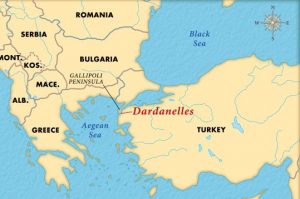
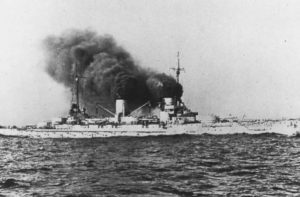 The Dardanelles is a narrow strait running between the Black Sea in the east and the Mediterranean Sea in the west. In World War I it was a much contested area right from the start. It was the subject of a naval attack, spearheaded by Winston Churchill, who was at that time Britain’s young first lord of the Admiralty. On March 18, 1915, six English and four French battleships headed toward the strait. When they reached the area, Turkish mines blasted five of the ships, sinking three of them and forcing the Allied navy to draw back until land troops could be coordinated to begin an invasion of the Gallipoli peninsula. With troops from the Ottoman Empire and Germany mounting a spirited defense of the peninsula, however, the Gallipoli offensive turned into a significant setback for the Allies, with 205,000 casualties among British Empire troops and nearly 50,000 among the French.
The Dardanelles is a narrow strait running between the Black Sea in the east and the Mediterranean Sea in the west. In World War I it was a much contested area right from the start. It was the subject of a naval attack, spearheaded by Winston Churchill, who was at that time Britain’s young first lord of the Admiralty. On March 18, 1915, six English and four French battleships headed toward the strait. When they reached the area, Turkish mines blasted five of the ships, sinking three of them and forcing the Allied navy to draw back until land troops could be coordinated to begin an invasion of the Gallipoli peninsula. With troops from the Ottoman Empire and Germany mounting a spirited defense of the peninsula, however, the Gallipoli offensive turned into a significant setback for the Allies, with 205,000 casualties among British Empire troops and nearly 50,000 among the French.
When the Allies got involved, the latter offensives in Mesopotamia and Palestine saw more success. By September 1917, the crucial cities of Jerusalem and Baghdad were both in British hands. As the war stretched into the following year, these defeats and an Arab revolt had combined to destroy the Ottoman economy and devastate its land. Some 6 million people were dead and millions more starving. In early October 1918, unable to bank on a German victory any longer, the Turkish government in Constantinople decided to cut its losses and approached the Allies about brokering a peace deal. On October 30, 1918, British and Turkish representatives signed the Treaty of Mudros, which ended Ottoman participation in World War I. According to the terms of the treaty, Turkey had to demobilize its army, release all prisoners of war, and evacuate its Arab provinces, the majority of which were already under Allied control…and open the Dardanelles and Bosporus to Allied warships.
This last condition was fulfilled on November 12, 1918, the day after the armistice, when a squadron of British warships steamed through the Dardanelles, past the ruins of the ancient city of Troy, toward 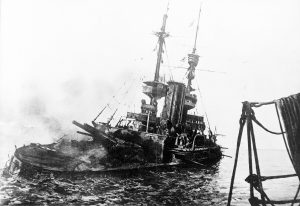
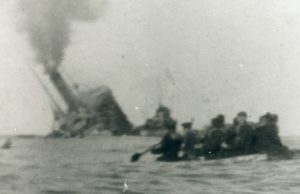 Constantinople. By the post-war terms worked out by the Allies in the Treaty of Sevres in 1920, the waterways that were formerly under Ottoman rule…including the Dardanelles, the Sea of Marmora and the Bosporus…were now placed under international control, with the designation that their “navigation…shall in future be open, both in peace and war, to every vessel of commerce or of war and to military and commercial aircraft, without distinction of flag.”
Constantinople. By the post-war terms worked out by the Allies in the Treaty of Sevres in 1920, the waterways that were formerly under Ottoman rule…including the Dardanelles, the Sea of Marmora and the Bosporus…were now placed under international control, with the designation that their “navigation…shall in future be open, both in peace and war, to every vessel of commerce or of war and to military and commercial aircraft, without distinction of flag.”
 For as long as I have known my husband, Bob Schulenberg, he has had a job. He is a hard working man, who never quits…until now. Today, for the first time since he was sixteen years old, Bob doesn’t have a job to go to anymore. In the years I have known and been married to Bob, he has had only two jobs. The first in a uranium mine where he worked from 1973 to 1989, when he went to work for the City of Casper. He has worked at the City of Casper for a little over 27 years. One of the girls in human resources, Tracy did a little bit of figuring to come up with some interest figures about how much time that 27 years really is. According to her calculations, for Bob’s May 1, 1989 start date through his last working day for the City of Casper, June 30, 2016, figures up to be 9,922 days, or 14,287,680 minutes, or 857,260,800 seconds. Anyway you look at it, 27 years is an incredible accomplishment.
For as long as I have known my husband, Bob Schulenberg, he has had a job. He is a hard working man, who never quits…until now. Today, for the first time since he was sixteen years old, Bob doesn’t have a job to go to anymore. In the years I have known and been married to Bob, he has had only two jobs. The first in a uranium mine where he worked from 1973 to 1989, when he went to work for the City of Casper. He has worked at the City of Casper for a little over 27 years. One of the girls in human resources, Tracy did a little bit of figuring to come up with some interest figures about how much time that 27 years really is. According to her calculations, for Bob’s May 1, 1989 start date through his last working day for the City of Casper, June 30, 2016, figures up to be 9,922 days, or 14,287,680 minutes, or 857,260,800 seconds. Anyway you look at it, 27 years is an incredible accomplishment.
Bob has never been a man who sits around, and his retirement will be no different. He loves working on cars for family and friends, and already has several jobs lined up to keep him busy…after he takes a couple of weeks off that is. After all, he is going to have to get used to this new direction his life is taking, and what better way than to relax for a couple of weeks before diving into the new ventures he is bound to take on.
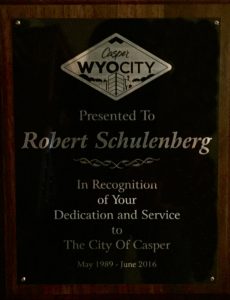
Of course, being retired will mean that he has more time for our favorite pastime…hiking. We are planning several trips in the near future to go hiking, some just for a weekend, because, after all, I am not retired yet, and others for a week at a time. Of course, no matter how long we are able to go for, we always enjoy our hiking. We love getting out in nature, and especially getting back in the trees.
I don’t know if Bob feels like not having a job is as strange as I feel like it is, but I’m sure he will quickly get used to it. It’s like getting a drivers license. At first it’s strange to be free to go when you want to, but then you get used to it, and it’s just normal. Before very long, retirement will be the same. So without further ado, Bob is calling it a career, and now he is off to new adventures. Congratulations on your retirement Honey!! I know your new adventures are going to be amazing. You’ve earned it.

